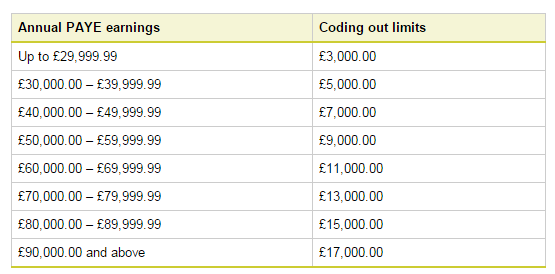Currently, HM Revenue & Customs can collect tax debts of up to £3,000 by adjusting your Pay As You Earn (PAYE) tax code. HMRC refers to this as ‘coding out’. The effect of this is to recover the debt from your income, by increasing the amount deducted from your income during the tax year.
This applies if you have a debt with HMRC and:
• are an employee paying tax through (PAYE), and/or
• receive a taxable UK-based private pension
HMRC are now increasing the amount of debt that can be recovered through your tax code if your annual earnings are £30,000 or more. To do this, HMRC will apply a sliding scale to your main PAYE income. The maximum amount that can be coded out is being increased to £17,000 (where earnings exceed £90,000 a year).
These changes will only apply to underpaid Self-Assessment and Class 2 National Insurance debts and Tax Credit overpayments. Changes will be reflected in your 2015-16 tax code and we will write to you before we collect any debts through your PAYE code from April 2015.
If your earnings are less than £30,000, there’s no change. Check the table below if your earnings are above £30,000 & its coding out limits from HMRC website:
More information on this at Collecting overdue tax through your tax code: changes to the amount HMRC can collect
Coding out the unpaid 2013/14 tax is only possible if you submitted your paper tax return by 31 October 2014 or file your tax return online by 30 December 2014.
This applies if you have a debt with HMRC and:
• are an employee paying tax through (PAYE), and/or
• receive a taxable UK-based private pension
HMRC are now increasing the amount of debt that can be recovered through your tax code if your annual earnings are £30,000 or more. To do this, HMRC will apply a sliding scale to your main PAYE income. The maximum amount that can be coded out is being increased to £17,000 (where earnings exceed £90,000 a year).
These changes will only apply to underpaid Self-Assessment and Class 2 National Insurance debts and Tax Credit overpayments. Changes will be reflected in your 2015-16 tax code and we will write to you before we collect any debts through your PAYE code from April 2015.
If your earnings are less than £30,000, there’s no change. Check the table below if your earnings are above £30,000 & its coding out limits from HMRC website:
More information on this at Collecting overdue tax through your tax code: changes to the amount HMRC can collect
Coding out the unpaid 2013/14 tax is only possible if you submitted your paper tax return by 31 October 2014 or file your tax return online by 30 December 2014.
If you have any queries, post them as comments below.
Contact us to know more on these changes and what changes you need to make to your small business!


No comments:
Post a Comment